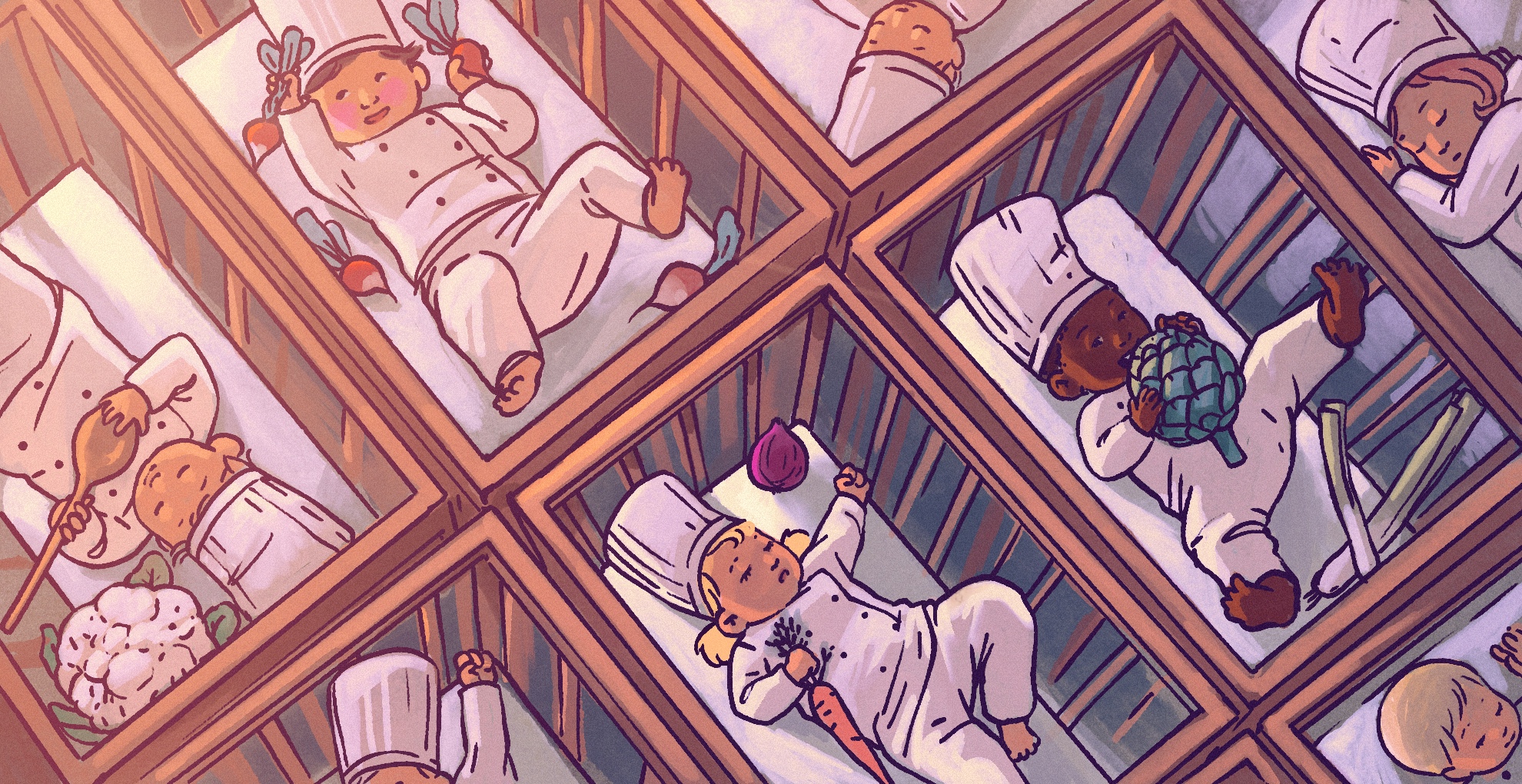Culture of the Kitchen: Iliana Regan
René Redzepi’ recently wrote this conversation-starter for Lucky Peach on how and if kitchen culture needs to change. Since then we’ve been reaching out to a number of chefs to join the dialogue, asking them to tell us about their kitchen environment, how they run their restaurants, and what they think the future holds. Here is a response from Iliana Regan, the chef of Elizabeth and Bunny, the Micro Bakery, and Wunder Pop in Chicago.
Intensity has been an essential aspect of all the fine dining kitchens I’ve worked in. In the casual restaurants I’ve worked in, the pressure is more about getting through service if it was high volume than the actual quality.
The intensity manifests in all sorts of ways. Sometimes it’s good intensity, with emphasis on service, food preparation, plating—all the things that should have intensity. It’s good intensity when it comes with the desire for us to be better as a team.
I think intensity can be bad when it is about those same things but for an individual’s personal gain over the other people in the picture—whether it’s just for the chef, or if it’s a battle of front of house versus back of house.
It’s bad when it involves putting people down. As chefs we are teachers and if we are ridiculing our students, who we haven’t properly taught, we are at fault. But if we taught them and gave them the proper tools and opportunities to excel in a positive way and they continue not to learn or improve over time, then the situation has to be properly addressed.
This is usually the point when I let them go. They are not part of the team. I don’t like to repeat myself, and since I’m not a chef who yells, I give my employees a few chances. If they continue not to listen or learn, then it’s not me, it’s them.
When conflicts arise and shit gets blown up I let the pieces fall and see what happens. I don’t waste much time. When there is a common denominator it’s clear who is the rabble-rouser. More than being a family, we are a wolf pack. When someone doesn’t work for the good of the pack, we kick them out.
I’ve also had a few chefs blame me for their lack of “push,” because I wasn’t yelling at them or breathing down their necks or breaking them down to build them back up. I’ve told them that I’m not responsible for their lack of ambition. Their desire to succeed has to come from within them—not from my yelling or cursing at them.
Nearly every chef who comes through our doors wants to be a sous chef, and this is where the dark side of me has to come out. When I have a sous chef I hold them accountable. I don’t waste energy yelling, but I do breathe down their necks and after a while I might burn them out. Three times I have hired from outside the restaurant and each lasted no more than a month. My strongest sous chefs are always those who can grow into the position. They are people I know I have taught who have also been able to teach me. Internal promotion helps us maintain the culture that I work hard to build.
The pressure I apply in the kitchen is focused on the taste of our food, the presentation of it on the plate, and the way in which we serve it. I emphasize that we are telling a story about terroir: the farms, fields, and woods from which we create our menu. I create pressure by emphasizing to the staff that only a fool would dine at Elizabeth and only give me the credit. I tell them that Elizabeth is all of us, no matter who created the dish. I respect their food and they need to respect mine, because when it’s under this roof it is all of us. I create pressure during service for them to focus, to make everything as best they can. I don’t serve a dish if the flavor is off or the plate doesn’t look right. I try to maintain and check everything during service as much as humanly possible.
I create pressure by cleaning. I am always cleaning after myself and stressing the importance of our mise en place, our environment, and the way we work to be clean. I think if we are not clean we cannot be organized and being organized with our prep and space means our heads are organized, which means we can focus.
I ensure that this pressure remains positive by being an example. If they are not cleaning correctly, I make sure that I am. If they are not cooking or plating right, I make sure that I am. If they are not coming in on time, I make sure that I am. If they are not noticing that water glasses need to be refilled for guests, I make sure that I am.
In most of the fine dining establishments I’ve worked the chef has been the leader. And I’ve seen both kinds of systems work. I’ve seen mean-spirited leaders lead well and create a staff who want to do good by him or her, yet reinforce the negative environment between one another. I’ve seen poor behavior in self-seeking kitchens that can still do well—but I don’t think the environment has long-term sustainability because it starts to leak outside of the restaurant and onto the guests.
On the other side of the spectrum I’ve seen chefs be disciplinarians in the most graceful ways and make a restaurant into a complete success. I know for myself that I’m not setting an example if I can’t get the rest of the staff on board. Again, I try to be as best an example as I can. The better I am, the better my staff will be.
At Elizabeth, we are small, so I do our books, payroll, social media, public relations, marketing, create the menus, and train the staff. I have to work extra hard with the kitchen because during one day I might be doing five different things, from photographing food to logging payroll to creating a new dish. They don’t have me next to them all day and they don’t have a full grasp of all I do. I have to make sure that the time I’m in the kitchen with them is quality time.
Currently we do not have a sous chef, kitchen manager, front of the house manager – there is only myself. There is no hierarchy, and honestly I wish it could be like this all the time. I know this doesn’t work in most restaurants, but we seem to be our best under this structure. However, I know this isn’t sustainable in the long run, especially with my other restaurants calling on me. A hierarchy is important, but what is more important than having hierarchy is having leaders the staff can respect.
I’m not sure what the future holds for kitchens. The culture is changing a little at a time. I think chefs will still remain the disciplinarians because we are always going to have unruly young men and women who have kitchen jobs because they don’t conform to a traditional societal role. I think it just depends on what we can do to encourage, teach, and how we influence them in a more constructive and positive way than by beating them down. While I think there will always be those out there who don’t respond unless they are beat down, I know they won’t thrive in my kitchen. And sadder still, I think that very few of them end up staying on and having a career in this industry.




